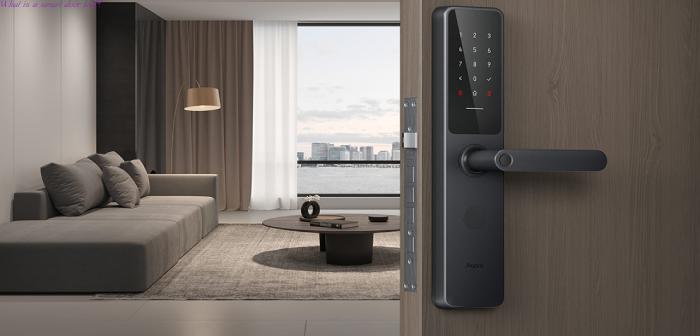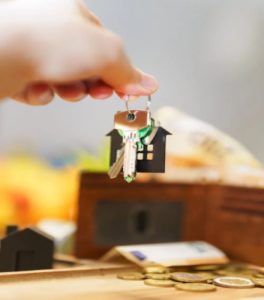What Is A Smart Door Lock?

What is a smart door lock?
A smart door lock is a modern electronic lock system that provides increased security and convenience for homeowners and property owners. It is possible to combine these locks with smart home systems and operate them remotely using smartphones, tablets, or other linked devices. These are some of the main attributes and capabilities of smart door locks:
Remote Access: Smart door locks allow users to lock and unlock their doors remotely using a mobile app or a web portal. This can be particularly useful for granting access to visitors or service providers when you’re not at home.
Keyless Entry: Many smart locks eliminate the need for traditional keys. Instead, they use methods like PIN codes, fingerprints, key fobs, or smartphone apps to authenticate users.
Security Alerts: Smart locks often provide real-time notifications about the status of your door. You can receive alerts when someone unlocks the door, or if there’s any suspicious activity.
Integration: They can be integrated with other smart home devices, such as security cameras, alarms, and voice assistants like Amazon Alexa or Google Assistant. This allows for a more comprehensive and automated security system.
User Profiles: You can create multiple user profiles with different access levels. For example, you can grant temporary access to a guest, restrict access to certain users, or provide full access to family members.
Log and History: Smart locks often maintain a log of who accessed the door and when. This can be useful for keeping track of entry and exit times.
Battery-Powered: Most smart locks run on batteries, so they continue to work even during power outages. Some models have backup power options.
Easy Installation: Many smart locks are designed to be easily retrofitted onto existing doors without the need for extensive modifications.
Physical Key Backup: While these locks are often keyless, they often come with a traditional key slot for manual unlocking in case of emergencies or system failures.
Variety of Models: There is a wide range of smart lock models available, from basic ones that only provide remote access to more advanced models with additional features like geofencing, auto-locking, and more.
Smart door locks can enhance security, convenience, and peace of mind. However, it’s essential to choose a reliable and secure model, regularly update its software, and follow best practices for online security to ensure the safety of your home.
How does smart door lock work?
Smart door locks, also known as electronic door locks or digital door locks, provide a convenient and secure way to access your home or property. These locks rely on technology to grant or deny access, and their operation can vary depending on the specific model and manufacturer. However, here’s a general overview of how smart door locks typically work:
Keyless Entry: Intelligent door locks do away with the necessity for conventional keys.
Instead, they offer various methods of keyless entry, including:
a. Keypad Entry: Many smart locks have a built-in keypad that allows
To open the door, users must input a PIN.
b. Smartphone App: Smart locks are often integrated with smartphone apps, allowing you to lock or unlock the door using your mobile device. These apps can work via Bluetooth or Wi-Fi connections.
c. Biometric Entry: Some advanced smart locks feature biometric recognition, such as fingerprint scanning, to grant access.
d. Remote Control: You can control some smart locks remotely through the internet. When you’re not at home, this is especially helpful for allowing visitors or service providers access.
Connectivity: Smart locks typically connect to your home network using technologies like Wi-Fi, Bluetooth, or Z-Wave. This connectivity enables remote access, allowing you to control the lock from your smartphone or computer.
Authentication: To ensure security, smart locks use various methods of user authentication. This can include PINs, passwords, biometrics, or digital keys generated by the lock’s app.
Secure Communication: Communication between the smart lock and your smartphone or other devices is usually encrypted to prevent unauthorized access.
Power Source: Smart locks are powered by batteries or wired into your home’s electrical system. Battery-powered models often provide alerts when the batteries are running low.
Integration: Many smart locks can be integrated into larger smart home ecosystems, such as Apple HomeKit, Google Assistant, or Amazon Alexa. This allows you to control your lock as part of your overall smart home setup.
Logs and Alerts: Smart locks often keep a record of who enters and exits, which can be useful for security and monitoring. Some locks can also send alerts to your smartphone when someone locks or unlocks the door.
Backup Key: To ensure access in case of a power outage or lock malfunction, many smart locks include a physical key as a backup.
Installation: Installing a smart lock usually requires some DIY skills or professional installation, depending on the lock type and your home’s existing hardware.
Security Features: Many smart locks offer additional security features, such as auto-locking, tamper alerts, and the ability to grant temporary access to guests.
It’s important to choose a smart lock that meets your specific needs and preferences and to follow the manufacturer’s instructions for installation and usage to ensure your home remains secure.
Smart door lock feature
Smart door locks offer a range of features designed to enhance security, convenience, and control for homeowners and businesses. Here are some of the key features commonly found in smart door locks:
Keyless Entry: Smart locks often enable keyless entry through methods such as PIN codes, smartphone apps, or even biometric recognition (like fingerprints or facial recognition). This eliminates the need for physical keys and the associated security risks.
Remote Access: Most smart locks can be controlled remotely through a smartphone app, allowing users to lock or unlock the door from anywhere with an internet connection. This feature is convenient for letting in guests, service providers, or checking the lock’s status.
Guest Access: Smart locks enable homeowners to provide temporary access to guests, contractors, or service providers. You can set specific time-limited access codes or send digital keys to authorized users.
Auto-Locking: Some smart locks can automatically lock the door after a specified period of inactivity, providing an extra layer of security.
Integration with Smart Home Systems: Many smart locks are compatible with popular smart home platforms like Amazon Alexa, Google Assistant, or Apple HomeKit. This enables voice control and compatibility with other smart home appliances.
Security Alerts: Smart locks often come with security features such as
tamper alerts, incorrect code entry alerts, and low battery warnings. These notifications help keep you informed about the status of your lock.
Access History: You can review an access history log to see when the door was locked or unlocked and which codes were used. This is particularly useful for security and monitoring purposes.
Physical Key Backup: Despite being “smart,” many smart locks still provide a traditional key entry option as a backup in case of electronic malfunctions or emergencies.
Battery Life: Smart locks are typically battery-operated. It’s essential to consider the battery life and have a plan for changing or recharging batteries when necessary.
Geofencing: Some smart lock apps offer geofencing features, allowing the lock to automatically unlock or lock when you approach or leave your home based on your smartphone’s location.
Voice Control: If integrated with voice assistants like Alexa or Google Assistant, you can lock or unlock your door using voice commands.
Built-In Cameras: Some advanced smart locks have built-in cameras or doorbell cameras that provide additional security features and allow you to see who’s at the door.
Integration with Security Systems: Smart locks can be integrated with security systems, enhancing overall security. For example, they can be set to trigger alarms or surveillance cameras in the event of unauthorized access.
Weather Resistance: For outdoor applications, look for smart locks designed to withstand various weather conditions.
It’s essential to research and choose a smart door lock that best suits your needs and integrates seamlessly with your existing smart home setup if you have one. Additionally, be mindful of cybersecurity to protect your smart lock from potential hacking attempts.
Smart door lock inconvenience
Smart door locks offer numerous conveniences, such as remote control, easy access management, and integration with other smart home devices. However, they can also come with certain inconveniences, including:
Technical Issues: Like any electronic device, smart locks can experience technical problems. These might include connectivity issues, software glitches, or malfunctions that prevent you from locking or unlocking your door.
Battery Life: Most smart locks rely on batteries, which need to be replaced or recharged periodically. Forgetting to do so can lead to lockouts, which can be a significant inconvenience.
Lockout Risk: With traditional locks, losing a key can be inconvenient, but it’s a relatively straightforward problem to solve. With a smart lock, losing your smartphone or forgetting your access code can result in being locked out of your own home.
Cybersecurity Concerns: Smart locks are connected to the internet, and this makes them vulnerable to hacking. While many manufacturers take security seriously, there is always a risk that someone could exploit vulnerabilities to gain unauthorized access to your home.
Compatibility Issues: Not all smart locks work seamlessly with all smartphones or smart home systems. Ensuring compatibility can be a hassle, and if you change your devices or system, it may require a reconfiguration of your lock.
Limited Guest Access: If you have guests staying at your home, providing them with access to your smart lock can be less straightforward than giving them a spare key. Temporary access codes need to be generated, which can be cumbersome.
Power Outages: Smart locks may become inoperable during power outages, depending on their backup power options. This can leave you locked out or vulnerable during emergencies.
Data Privacy Concerns: Using a smart lock often involves sharing data with the manufacturer or a third-party service, raising privacy concerns about who has access to your lock usage data.
Complex Setup: Initial setup and configuration of a smart lock can be more complex and time-consuming than installing a traditional lock. This can be frustrating if you’re not tech-savvy.
Cost: Compared to conventional locks, smart locks are often more costly. If cost is a concern, this can be a significant inconvenience.
In summary, while smart door locks offer several advantages, they also come with potential inconveniences and risks. It’s essential to weigh these pros and cons before deciding whether a smart lock is the right choice for your home.
Also read:- 7 Useful Strategies to Educate Your Staff on Data Savviness




